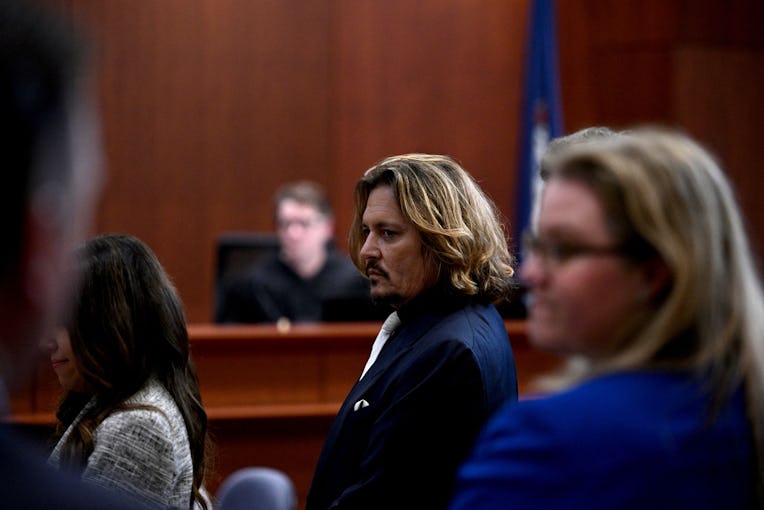What Does Gen Z See in Johnny Depp?
On TikTok, he's a "whole ass mood." Now his stans have flooded the comments section of his defamation trial's live feed.

Today marks the third day in the multi-million dollar defamation suit between Johnny Depp and Amber Heard taking place in Virginia. For those who are like, “Didn’t this happen two years ago or whatever?” the answer is, “Yes, sort of, but in England,” where Depp sued the British press for calling him a “wife-beater.” This particular lawsuit is between Depp and Heard herself, regarding an op-ed that Heard published in the Washington Post about being the survivor of domestic abuse. Though the piece never mentions Depp by name, he sued for defamation, she counter-sued, and now we’re all in Virginia.
The live feed of the Depp/Heard trial is less like a CNN feed and more like the VMAs or a Twitch stream. That’s because, for a reason I can’t quite determine, a variety of Gen Z internet users have taken an active, if not aggressive, interest in the case, joining hands across the world to support Depp, who they see as a pious, gentle victim, against Heard, who they see as a vindictive, lying manipulator. The comments in the chat function of the live feed alternate between “I LOVE YOU JOHNNY” to “AMBER’S COOKED.” Every now and then, one person will say something along the lines of, “Amber looks so sad,” to which everyone will respond by telling that person to shut the fuck up. Rinse, repeat. One comment on the trial’s live feed said: “Why is the lawyer so nosy???” Another said: “Amber looks EXACTLY like my high school nemesis.”
The Gen Z worship of Depp extends far past the comments section of his trial and into Twitter and Instagram and especially TikTok. The TikTok hashtag “#justiceforjohnnydepp” has 1.1 billion views. A scattered viewing of some of the hashtag’s most popular entries include “Johnny Depp being a whole mood at his trial today,” a fan meeting Depp on his way out of a London courthouse back in 2020 captioned “the best day of my life,” lists of celebs who support Depp (ranging from Doug Stanhope to Judi Dench), to a fan telling Depp to “keep on fighting” because the public is united on his side. The support for Depp spans gender and sexuality – it’s not easy enough to write this off as “horny girls” when it seems to be far more encompassing.
Johnny Depp was People’s Sexiest Man Alive twice: in 2003 and in 2009, bookending the years of my adolescence. In the years since his height of fame in the mid-aughts, he’s starred in movies like Alice in Wonderland (bad), Public Enemies (good), The Tourist (idk), Mortdecai (remember this?), Black Mass (you DEFINITELY don’t remember this), and two out of three of the Fantastic Beasts movies, both of which saw Marvel-like numbers in the box office and are arguably the only massively successful projects of his later career. For an audience born between the late ‘90s and early 2000s, their primary hook for Depp would otherwise be, what, Pirates 4? Dark Shadows?
It is difficult to determine what the Depp stan army sees in their idol. On the one hand, he’s a soft-spoken, Euro-aspiring actor who they can pin their childhood nostalgia to: the ubiquity of the Pirates films and reemergence of Tim Burton-style aesthetics are rampant on TikTok. (Remember, this is the platform where everyone got obsessed with sea shanties for all of twelve minutes.) On the other hand, well documented stories about his excessive drinking and uncharming texts with Paul Bettany go unmentioned. What this reminds me, perhaps, most of all, is the “woobification” of a dark, brooding male figure often seen on LiveJournal and Tumblr. We went through this with Severus Snape and Loki and the BBC Sherlock. That this would eventually cross over into a real-life scenario – especially regarding someone often seen in properties that have their own fandoms – is unsurprising. This, in tandem with the platform’s ability to make everything a true crime investigation, has allowed TikTok, more than Twitter, more than the courthouse in Virginia, to be a place of mounting evidence, of argument, of long-winded pleas for justice and righteousness.
Perusing the #justiceforjohnnydepp tag doesn’t suggest that this is a movement driven by an overwhelming contrarian take on the nature of domestic violence. These are not people who clamor against social justice warriors. These are people who are inclined to believe abuse allegations and who use terms like “gaslighting.” Yet the Depp/Heard case is an outlier of the #MeToo era, in that its coverage has not easily led to the exiling of one specific (male) party. It is difficult to scroll through the mountains of evidence on either side of their tumultuous divorce and find a worthy victor, or a perfect victim. But on the internet, that has never stopped anyone from trying.